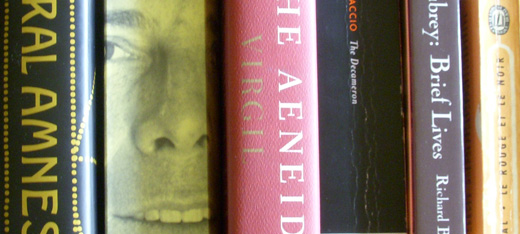Monday Morning Read
¶ Decameron VIII, ix shrieks more loudly for operatic treatment than any story so far. How can there not be a comic masterpiece called Bruno e Buffamalco? Then I remember the finale of Molière’s Le bourgeois gentilhomme, which sanitizes and perfumes Dr Simone’s “induction” by the “contessa di Civillari.” Still, I can hear the echoes of a rousing final chorus:
Così adunque, come udito avete, senno s’insegna a chi tanto non s’apparò a Bologna.
So now you have heard how wisdom is imparted to anyone who has not acquired much of it in Bologna.
¶ In the Aeneid, the Latian ambassadors to Diomedes — a Greek whose hostility to the Trojans they have sought in vain to rouse — rehearse the bad things that have happened to the Greeks as punishment for their attack upon Troy. To describe the grumbling discontent of the Latians, Virgil deploys one of those nature-pictures for which Latin poetry is so strangely famous:
          ceu saxa morantur
cum rapidos amnis, fit clauso gurgite murmur
vicinaeque fremunt ripae crepitantibus undis.
¶ In Aubrey, I dipped my toe in the substantial life of Thomas Hobbes that is the core of the Lives. More anon.
¶ In Merrill, the last three poems of First Poems, eighteenth-century metrics that seem, again in the manner of Edith Sitwell, to depict hermetic rites known only to rarefied souls. I have no objection to preciosity itself, but I dislike not knowing what’s going on. Very pretty lines, though; and the main thing is to look at them without trying to make sense. I do the poet the honor of recognizing that he is not, as second-rate poets do, merely dressing up the familiar in fancy tongue.
¶ In Le rouge et le noir, a scene out of Beaumarchais, although not nearly so neat; the marquis de La Mole wavers between admiration for Julien and Mathilde and an intense longing for the tabouret — regal footstool — that his daughter will never sit on if she has her own way. As if the author had been called away by some pressing need, the chapter ends inconclusively: “nous marchons ver le chaos.” Perhaps Stendhal is really a post-modernist, and not simply incompetent.
¶ Clive James on Dick Cavett: an interesting overview of American talk show hosts from Carson to Stewart that will make I wonder how much sense in thirty or forty years. (Perfect sense, possibly.) James captures the uncertainty of Mr Cavett’s perch so perfectly that I’m looking for a block of marble in which to chisel his line:
In America, however, play and seriousness make uneasy bedfellows.
Exactly! And this is why I have always felt out of place in the United States. I regard plain seriousness as lugubrious, and plain playfulness as futile. It is only when the two are harnessed that anything interesting happens in this life. My misfortune, then, to live among a race of self-selected utopians, a protestant among the puritans.

